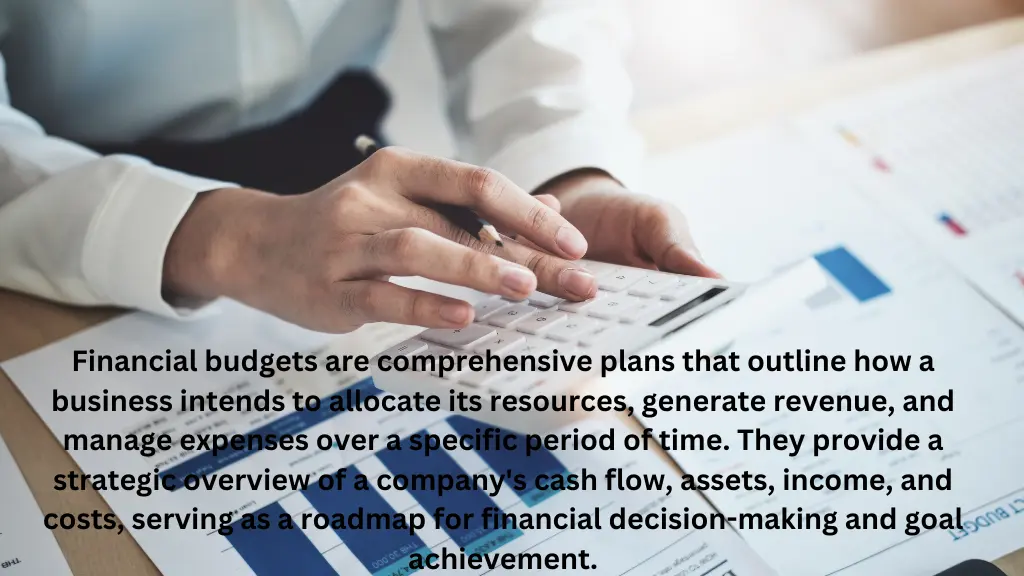What are financial budgets? They are the backbone of a company’s financial planning and management.
Financial budgets outline how a business intends to allocate its resources, manage expenses, and generate income over a specific period.
A financial budget is a strategic roadmap that guides decision-making, ensuring that every dollar spent aligns with the company’s objectives and long-term goals.
In this article, we will delve into the world of financial budgets, exploring their essence, types, creation process, best practices, and future developments.

We’ll unravel the mysteries that lie within these powerful tools, empowering you to navigate the financial landscape with confidence and achieve sustainable success.
What are financial budgets?
Financial budgets are comprehensive plans that outline how a business intends to allocate its resources, generate revenue, and manage expenses over a specific period of time. They provide a strategic overview of a company’s cash flow, assets, income, and costs, serving as a roadmap for financial decision-making and goal achievement.
The Essence of Financial Budgets
At its core, a financial budget is a meticulously crafted plan that outlines how a business intends to allocate its resources over a specific period.
It’s a roadmap that guides decision-making, ensuring that every dollar spent aligns with the company’s objectives and long-term goals.
Think of it as a navigational system that steers your business toward financial success, helping you avoid potential pitfalls and capitalize on opportunities.
But why is having a financial budget so important? Imagine setting sail on a voyage without a map or compass – you’d be drifting aimlessly, uncertain of your destination and vulnerable to the whims of the ocean currents.
A well-crafted financial budget is your compass, providing direction and helping you navigate the turbulent waters of the business world.
The Art of Budgeting: A Dance of Numbers and Strategies
Creating an effective financial budget is an art form that requires a delicate balance of foresight, analysis, and strategic thinking. It’s a process that involves:
1. Setting Clear Objectives
Before embarking on the budgeting journey, it’s crucial to establish clear and measurable objectives. Are you aiming to increase profitability, expand into new markets, or invest in research and development?
Defining your goals upfront will shape the budgeting process and ensure that your resources are allocated accordingly.
2. Forecasting and Analysis
Budgeting is not a guessing game; it’s a meticulous exercise in forecasting and analysis. Businesses must carefully examine historical data, market trends, and industry projections to make informed decisions about future revenue and expenses.
This process involves analyzing sales patterns, consumer behavior, and economic indicators to paint a realistic picture of what lies ahead.
3. Resource Allocation
Once the objectives and forecasts are in place, the real magic happens: resource allocation. This is where businesses strategically distribute their financial resources across various departments, projects, and initiatives.
It’s a delicate balancing act, ensuring that every dollar is invested wisely and aligned with the company’s priorities.
4. Monitoring and Adjustments
Budgeting is not a static process; it’s a dynamic journey that requires constant monitoring and adjustments.
As market conditions shift and unforeseen circumstances arise, businesses must be agile and adapt their budgets accordingly.
Regular reviews and course corrections are essential to keep the budgeting process on track and responsive to changing realities.
The Versatility of Financial Budgets
Financial budgets are not one-size-fits-all; they come in various forms, each tailored to specific business needs and objectives. Let’s explore some of the most common types:
Operating Budgets
Operating budgets are the bread and butter of financial planning. They outline the day-to-day expenses associated with running a business, such as salaries, rent, utilities, and supplies.
These budgets help businesses maintain a tight grip on their operational costs and ensure that they can sustain their core functions.
Capital Budgets
Capital budgets focus on long-term investments and asset acquisitions, such as purchasing new equipment, expanding facilities, or funding research and development projects.
These budgets are crucial for businesses seeking to grow and maintain a competitive edge in their respective industries.
Project Budgets
As the name suggests, project budgets are dedicated to specific initiatives or endeavors within a business.
Whether it’s launching a new product line, implementing a marketing campaign, or undertaking a major IT overhaul, project budgets ensure that resources are allocated efficiently and that the project stays on track, both financially and operationally.
Cash Flow Budgets
Cash flow is the lifeblood of any business, and cash flow budgets are designed to monitor and manage the ebb and flow of money.
These budgets help businesses anticipate and plan for periods of high and low cash flow, ensuring that they have the necessary funds to meet their financial obligations and seize opportunities as they arise.
Budgeting Best Practices: Tips for Success
While the budgeting process may seem daunting, there are several best practices that can help businesses navigate this financial labyrinth with ease:
1. Involve Key Stakeholders
Budgeting is not a solitary endeavor; it requires collaboration and input from various stakeholders within the organization.
By involving department heads, financial experts, and decision-makers, businesses can ensure that their budgets are comprehensive, realistic, and aligned with the company’s overall vision.
2. Embrace Technology
In today’s digital age, businesses have access to a wealth of budgeting software and tools that can streamline the process and enhance accuracy.
From spreadsheet templates to sophisticated budgeting applications, leveraging technology can save time, reduce errors, and provide real-time insights into financial performance.
3. Foster a Culture of Accountability
Budgets are only as effective as the people who implement and adhere to them. By fostering a culture of accountability and responsibility, businesses can ensure that budgets are respected and followed throughout the organization.
Regular reporting, performance reviews, and consequences for non-compliance can reinforce the importance of adhering to budgetary guidelines.
4. Remain Flexible and Adaptable
While budgets provide a structured plan, they should not be set in stone. Businesses must remain flexible and adaptable, ready to adjust their budgets as circumstances change.
Regularly reviewing and updating budgets can help businesses stay agile and responsive to market shifts, emerging trends, and unforeseen events.
The Future of Financial Budgets: Embracing Innovation
As technology continues to evolve, so too will the world of financial budgeting. Cutting-edge technologies like artificial intelligence, machine learning, and predictive analytics are poised to revolutionize the budgeting process, offering businesses unprecedented insights and forecasting capabilities.
Imagine a future where budgets are dynamically adjusted in real-time, responding to market fluctuations and consumer behavior with lightning speed.
Advanced algorithms could analyze vast amounts of data, identifying patterns and trends that would have been impossible to detect through traditional means.
Moreover, the integration of budgeting software with other business applications, such as customer relationship management (CRM) systems and enterprise resource planning (ERP) platforms, could provide a holistic view of a company’s operations, enabling more informed and strategic budgeting decisions.
As we embrace these technological advancements, the role of financial budgets will only become more crucial.
They will serve as the linchpin that connects various aspects of a business, ensuring seamless coordination and optimal resource allocation.
Conclusion
Financial budgets are more than just numbers on a spreadsheet; they are the navigational charts that guide businesses through the ever-changing tides of the market.
By mastering the art of budgeting, businesses can unlock a world of strategic decision-making, efficient resource allocation, and long-term financial success.
Whether you’re a small startup or a multinational corporation, the principles of financial budgeting remain the same: set clear objectives, conduct thorough analysis, allocate resources wisely, and remain agile and adaptable.
Embrace the power of budgeting, and watch as your business embarks on a journey towards financial prosperity.
So, what are you waiting for? Roll up your sleeves, sharpen your pencils, and dive into the captivating world of financial budgets – the key to unlocking your business’s full potential.






1 thought on “what are financial budgets? A Comprehensive Guide to Managing Your Business Finances”